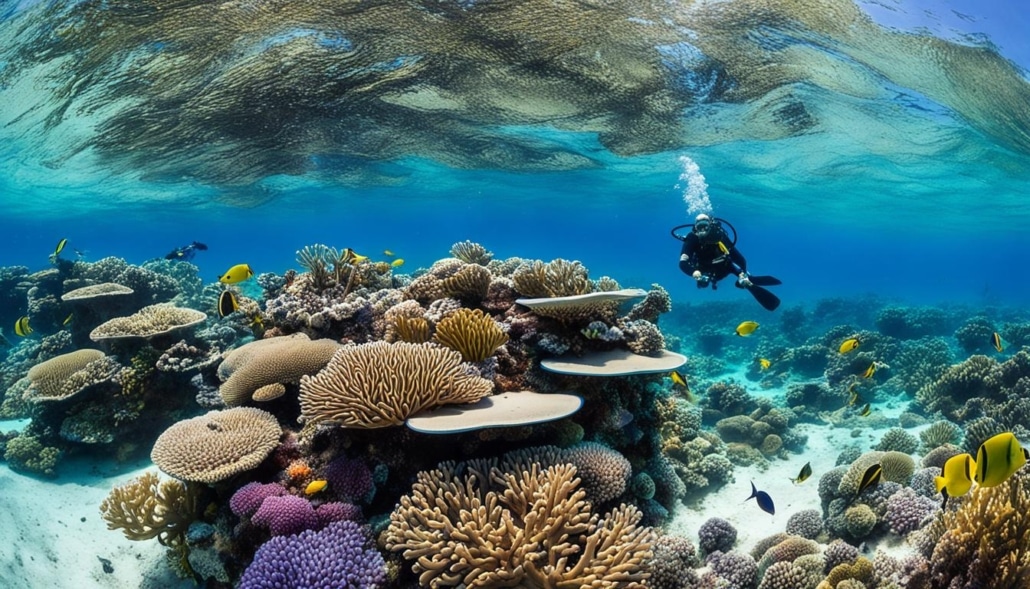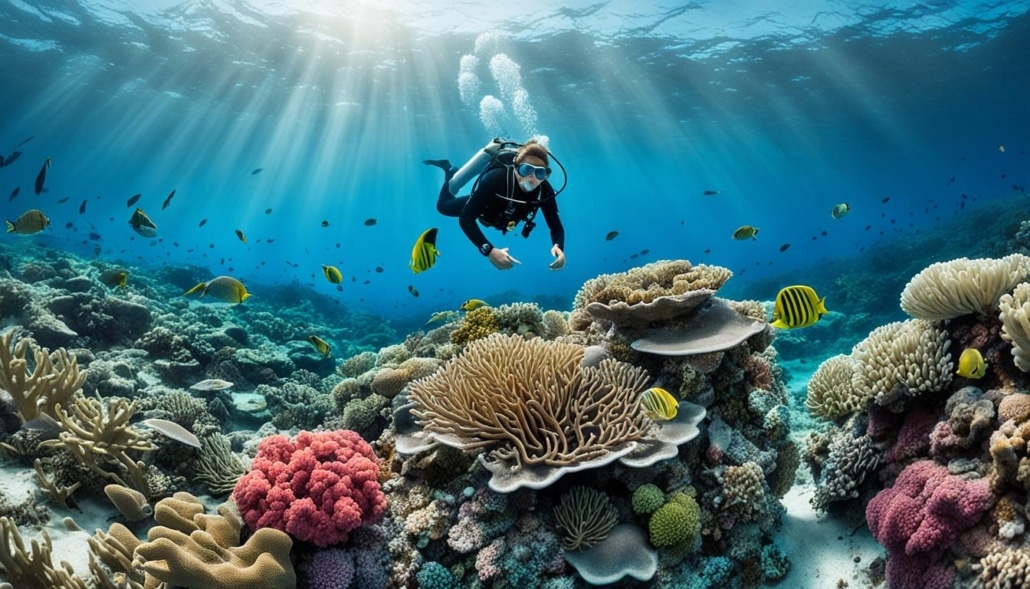Reef Restoration Projects: How Tourists Can Help
Reef degradation is a pressing global issue, with coral reefs suffering from the impacts of ocean warming, overfishing, destructive fishing practices, and coastal development. The Caribbean reefs, in particular, have experienced a significant decline in recent decades, with a 50% decrease in coral cover. To address these challenges, coral reef restoration initiatives have emerged, aiming to restore and preserve these vital ecosystems.
Diving and eco-tourism play a crucial role in coral reef restoration efforts. By educating tourists about the importance of reefs and involving them in restoration activities, these projects can enhance conservation awareness and support sustainable practices.
Key Takeaways:
- Coral reef restoration is essential in combating the decline of these valuable ecosystems.
- Tourists can actively participate in restoration efforts through diving and eco-tourism activities.
- Coral restoration projects in the Caribbean have been intensified to counteract the decline in coral cover.
- By supporting reef restoration, tourists contribute to the preservation of marine biodiversity.
- Educating and involving tourists in conservation efforts can lead to sustainable tourism practices.
The Challenges of Reef Restoration in the Caribbean
Despite the advancements in coral restoration techniques, successful reef restoration in the Caribbean faces significant challenges. These bottlenecks hinder the progress towards restoring healthy coral ecosystems and require innovative solutions to overcome.
Reef Restoration Bottlenecks
One of the main challenges in reef restoration is the slow growth rates of foundational coral species. For instance, species like Acropora cervicornis and A. palmata, commonly known as staghorn and elkhorn coral, respectively, have limited growth rates. This slow growth limits the rate at which coral cover can increase, impeding the restoration process.
Logistic and Economic Obstacles
Another challenge is the logistical and economic obstacles associated with underwater restoration work. Diving operations and the need for permits pose significant challenges, hindering large-scale restoration efforts. The cost and complexity of conducting underwater restoration work further contribute to the logistical and economic barriers faced in the Caribbean.
Limited Species and Genetic Diversity
Additionally, current restoration programs often suffer from low species diversity and limited genetic diversity. This compromises the adaptive capacity and resilience of Caribbean coral communities. A lack of diverse coral species and genetic variations reduces the ability of reefs to withstand environmental stressors, making them more vulnerable to degradation.
Overcoming these challenges requires a multi-faceted approach that combines scientific research, technological advancements, and effective collaboration among stakeholders. By addressing the bottlenecks, slow growth rates, and logistic and economic obstacles, we can enhance the effectiveness and scalability of reef restoration efforts in the Caribbean.
The Role of the Tourism Sector in Reef Restoration
The tourism sector, especially in coastal tropical areas like the Caribbean, benefits greatly from coral reefs. Beyond financial contributions, the tourism sector can actively contribute to reef restoration by utilizing its resources and networks. Private sector-driven programs, like the one implemented by Iberostar Hotels and Resorts, demonstrate how collaboration with the local community, government, and academia can streamline legal and operational processes for restoration. By working together, the tourism sector can help overcome the bottlenecks of scalability, economic feasibility, and long-term stability in coral restoration.
Collaboration is key in solving the challenges faced by reef restoration efforts. The tourism sector can harness its influence and resources to mobilize support from various stakeholders. By partnering with local communities, government agencies, and academic institutions, private sector-driven programs create a collaborative framework that fosters expertise sharing and synergistic solutions. Through these collaborations, scalable solutions can be developed and implemented to effectively address the complexities of reef restoration.
One exemplary program that highlights the power of collaboration is the initiative undertaken by Iberostar Hotels and Resorts. Recognizing the importance of coral reefs to both the environment and the tourism industry, Iberostar has partnered with the government of the Dominican Republic, local communities, and scientists from the University of Miami to establish the “Wave of Change” program. This program focuses on restoring and protecting coral reefs through research, sustainable tourism practices, and community engagement. By combining the expertise and resources of these diverse stakeholders, the program has achieved significant progress in reef restoration and conservation.
“Private sector-driven programs, like the one implemented by Iberostar Hotels and Resorts, demonstrate how collaboration with the local community, government, and academia can streamline legal and operational processes for restoration.”
Moreover, the tourism sector’s involvement in reef restoration goes beyond financial contributions. Through their networks and reach, tourism companies can raise awareness among travelers about the importance of sustainable practices and responsible tourism. By educating tourists about the fragility of coral reefs and the impact of their actions, the sector can promote positive behavioral changes that support conservation efforts. This collective effort contributes to the long-term stability of coral reefs by reducing destructive practices and promoting eco-friendly alternatives.
Benefits of Private Sector Collaboration in Reef Restoration
Private sector-driven programs offer unique advantages in the realm of reef restoration. These initiatives leverage the resources, expertise, and industry influence of tourism companies to drive impactful change. Some key benefits of private sector collaboration include:
- Enhanced financial support: Tourism companies have the financial capacity to invest in reef restoration projects, facilitating the allocation of necessary resources for restoration efforts.
- Operational efficiency: Private sector-driven programs can streamline restoration processes by utilizing their expertise in project management, logistics, and operations.
- Knowledge sharing: Collaboration between the tourism sector and other stakeholders, such as scientists, local communities, and government agencies, fosters knowledge transfer and innovation.
- Scalability: With the tourism sector’s wide reach, private sector collaboration provides the opportunity to scale up restoration efforts and expand the impact across multiple destinations.
Through collaboration, the tourism sector can contribute to scalable solutions that address the challenges faced by reef restoration. By leveraging their networks, influence, and resources, tourism companies can actively participate in restoration efforts and support the long-term health and sustainability of coral reefs.
Examples of Tourism Involvement in Reef Restoration
Several examples showcase the involvement of the tourism sector in reef restoration. These projects demonstrate how tourists can directly contribute to coral restoration while participating in sustainable tourism practices.
Living Reefs Foundation
The Living Reefs Foundation in Bermuda is a prime example of the tourism sector’s commitment to reef restoration. The foundation engages with tourists and local communities to actively participate in coral planting, cleaning, and research initiatives. By involving tourists in these hands-on activities, the Living Reefs Foundation promotes awareness and fosters a sense of responsibility towards the protection and restoration of coral reefs.
New Heaven Reef Conservation Program
“We believe that offering visitors the opportunity to learn about and participate in reef restoration is an effective way to raise awareness and empower individuals to make a positive impact on the environment.” – New Heaven Reef Conservation Program
The New Heaven Reef Conservation Program in Koh Tao, Thailand, is another commendable effort by the tourism sector. This program allows tourists to actively engage in coral planting and restoration activities. By participating in these programs, tourists not only contribute to reef restoration but also gain firsthand knowledge and appreciation for the importance of coral reefs in marine ecosystems.
Eye on the Reef Program
The Eye on the Reef program in Tropical North Queensland, Australia, is a unique initiative that combines tourism, citizen science, and reef conservation. Tourists are encouraged to contribute to reef health monitoring by reporting their observations of coral bleaching, fish abundance, and other critical data. Through their participation, tourists become stewards of the reef and actively contribute to its conservation.
Kuleana Coral Restoration
During the pause in tourism activities caused by the COVID-19 pandemic, Kuleana Coral Restoration in Hawaii has capitalized on the opportunity to conduct direct restoration work. This organization focuses on transplanting coral fragments from healthy reefs to degraded areas, enhancing the overall resilience and recovery of the coral ecosystem. By involving volunteers and local communities, Kuleana Coral Restoration creates a sense of collective responsibility and ensures the long-term sustainability of coral reefs.
How Tourists Can Contribute to Reef Restoration
Tourists can play a significant role in reef restoration efforts and help preserve these fragile ecosystems for future generations. Here are some actionable steps that tourists can take to contribute to reef restoration:
- Donate: Show your support by donating to recognized restoration projects. Your contributions will directly fund the necessary resources and initiatives needed to restore coral reefs. You can also consider adopting a coral, which helps provide ongoing support to restoration efforts.
- Choose Sustainable Accommodations: When planning your trip, opt for accommodations that prioritize sustainability and conservation practices. Look for resorts and hotels that have implemented eco-friendly measures to minimize their environmental impact.
- Participate in Eco-Friendly Activities: Engage in activities that promote eco-friendly practices and support conservation. Many tour operators offer snorkeling or diving experiences with an educational focus on marine conservation. By participating in these activities, you not only gain a deeper understanding of the reef ecosystem but also contribute to its preservation.
- Reduce Your Carbon Footprint: The root cause of reef degradation is climate change, so reducing your carbon footprint is crucial. Opt for sustainable transportation methods such as public transportation, walking, or biking whenever possible. If flying is necessary, consider purchasing carbon offsets to neutralize the environmental impact of your flights.
- Respect the Ocean: While exploring the reef, it is vital to respect the ocean and its inhabitants. Avoid touching or stepping on corals, as they are delicate and easily damaged. Maintain a safe distance from marine life and refrain from removing any souvenirs from the reef. Choose reef-safe sunscreen without harmful chemicals to protect yourself without causing harm to the coral reef ecosystem.
By following these simple actions, tourists can actively contribute to reef restoration and support the long-term health and sustainability of these vital marine ecosystems.
Conclusion
Coral reef restoration is crucial for the health of marine ecosystems and the sustainability of the tourism industry. The challenges facing reef restoration, such as slow growth rates and logistical obstacles, can be overcome with the active involvement of the tourism sector. By supporting and participating in reef restoration projects, tourists can play a vital role in scaling up restoration efforts.
Collaboration and sustainable practices are key in ensuring the success of reef restoration. Through partnerships between the tourism sector, local communities, governments, and academia, legal and operational processes can be streamlined, making restoration projects more feasible and effective. Additionally, tourists can contribute by choosing accommodations that support conservation, engaging in eco-friendly activities, and reducing their carbon footprint through sustainable transportation choices.
By working together, we can actively contribute to the conservation of coral reefs while enjoying our travel experiences. Through our collective efforts, we can preserve and recover these vital ecosystems, ensuring their existence for future generations to admire and appreciate.
FAQ
What are the major challenges to reef restoration in the Caribbean?
The slow growth rates of foundational coral species, logistical and economic obstacles of underwater work, and limited genetic diversity in current restoration programs are the major challenges to reef restoration in the Caribbean.
How can the tourism sector contribute to reef restoration?
The tourism sector can contribute to reef restoration by supporting and participating in conservation efforts, collaborating with local communities and organizations, and implementing sustainable practices.
What are some examples of tourism involvement in reef restoration?
Examples of tourism involvement in reef restoration include projects like Living Reefs Foundation in Bermuda, New Heaven Reef Conservation Program in Koh Tao, Thailand, Eye on the Reef program in Tropical North Queensland, Australia, and Kuleana Coral Restoration in Hawaii.
How can tourists contribute to reef restoration?
Tourists can contribute to reef restoration by donating to restoration projects, choosing accommodations that support conservation, participating in eco-friendly activities, reducing their carbon footprint, and respecting the ocean.
Why is coral reef restoration important?
Coral reef restoration is crucial for the health of marine ecosystems and the sustainability of the tourism industry. It helps to preserve and recover vital coral reef ecosystems for future generations.






Leave a Reply
Want to join the discussion?Feel free to contribute!